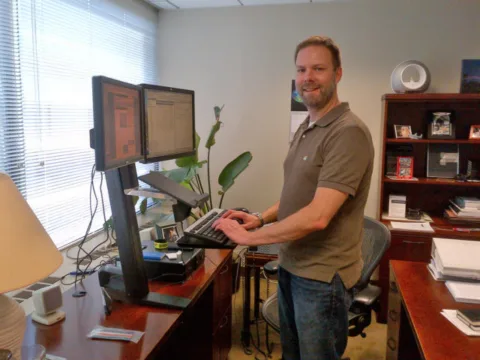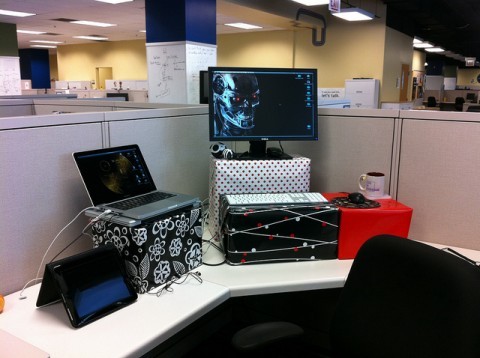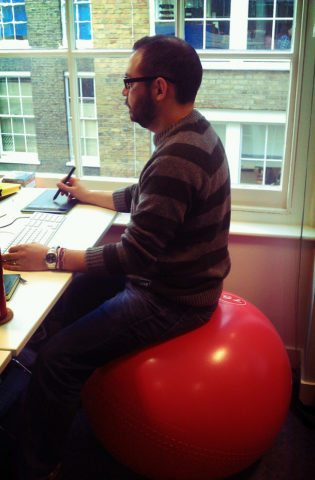Avoiding desk job health risks is something I take very seriously, especially because I work as a web copywriter and must spend an average of 9 hours each work day sitting in front of a computer screen.
As many of us know, sitting all day can lead to terrible health maladies.
A few of the most common desk job health risks include:
- Metabolic syndrome
- Heart attacks
- Strokes
- Neck pain
- Back pain
- Weight gain
- Increased blood sugar levels
- Carpal tunnel syndrome (particularly if you work at a computer)
- Musculoskeletal disorders in the lower back, legs, and knees
Making the problem even worse is the fact that I have learned my efforts to “undo” my sedentary lifestyle at work by biking and walking before or after work aren’t really going to overcome the effects on my body from my desk job.
So what can I do to avoid the desk job health risks?
Outside of quitting my office job and becoming a professional hockey player for a living (I love my teeth to much to do that), I wondered if there is any way to prevent the potential desk job health risks I may face down the line.
As it turns out, there are several things we can do while at work that could help prevent those health risks and allow us to live longer, healthier lives.
5 Ways To Avoid Desk Job Health Risks
#1 – Work at a standing desk.
While it might be out of the question for you — or your boss — to invest in a standing desk, there are plenty of ways to creatively jerry-rig one.
One idea can be seen below in the photo.
This crafty office worker propped up her keyboard and computer monitor on boxes so she could comfortably stand at the desk while doing her work.
Must read: 10 DIY Standing Desks
#2 – Walk laps around the office.
I’m never sitting for more than 30 minutes to 1 hour at a time. When I’m not at my desk, I’m usually taking a walk to the break room or walking up and down the hall just outside my office.
I do this to keep my blood circulating and to get my eyes away from the computer screen so I can avoid eyestrain, which is a problem I started suffering about a year into my current job.
Here are a few of my other tips for avoiding fatigue at work, plus a suggested daily schedule for healthy living behind a desk.
#3 – Stretch at your desk.
Even if you can’t get up from behind your desk as often as I do, that doesn’t mean you can’t do some exercises while you’re still inside your cubicle or in your office.
These links offer some great ideas for stretches you can do while you’re at work:
- The Ultimate “Deskercise” Stretch Routine
- Best Stretches For Office Workers
- 7 Easy Stretches To Do At Work
- Stretches All Desk Workers Should Do
#4 – Get a treadmill desk.
Before you laugh at me for suggesting what may seem like an outlandish idea, get this: Steelcase, one of the most renowned names in the office furniture industry, has been successful at selling the Walkstation.
Using a treadmill desk is a great way to avoid desk job health risks while burning a few calories, too — as much as 600 calories a day or 57 pounds a year!
Of course, if your boss isn’t willing to buy standing desks for everyone in the office, perhaps you could all band together and try to get your company to buy one that can be shared.
If you have deep pockets, you might even be able to buy one for yourself and get a special clearance to have it installed at work in lieu of a conventional cubicle or desk.
One of my former colleagues swore by his yoga ball chair, and for good reason, too.
Not only can an exercise ball chair help strengthen your core, but it can also improve your balance – all while you do your work at your desk job!
Must read: Why I Switched My Office Chair With An Exercise Ball
Hopefully, if you implement any of these ideas into your daily work routine, you’ll be able to avoid the common desk job health risks.
While the science is pretty clear that sitting all day can be very unhealthy for your body, using tips like the ones above may go a long way toward helping you enjoy a healthier life.
I want everyone to live their best life… for as long as possible. So I often write about the health screenings that we all should be getting — to help catch potential health issues early. (Yes, I get my screenings too.) I also share my knowledge and experience with specific health problems that I am personally familiar with.








